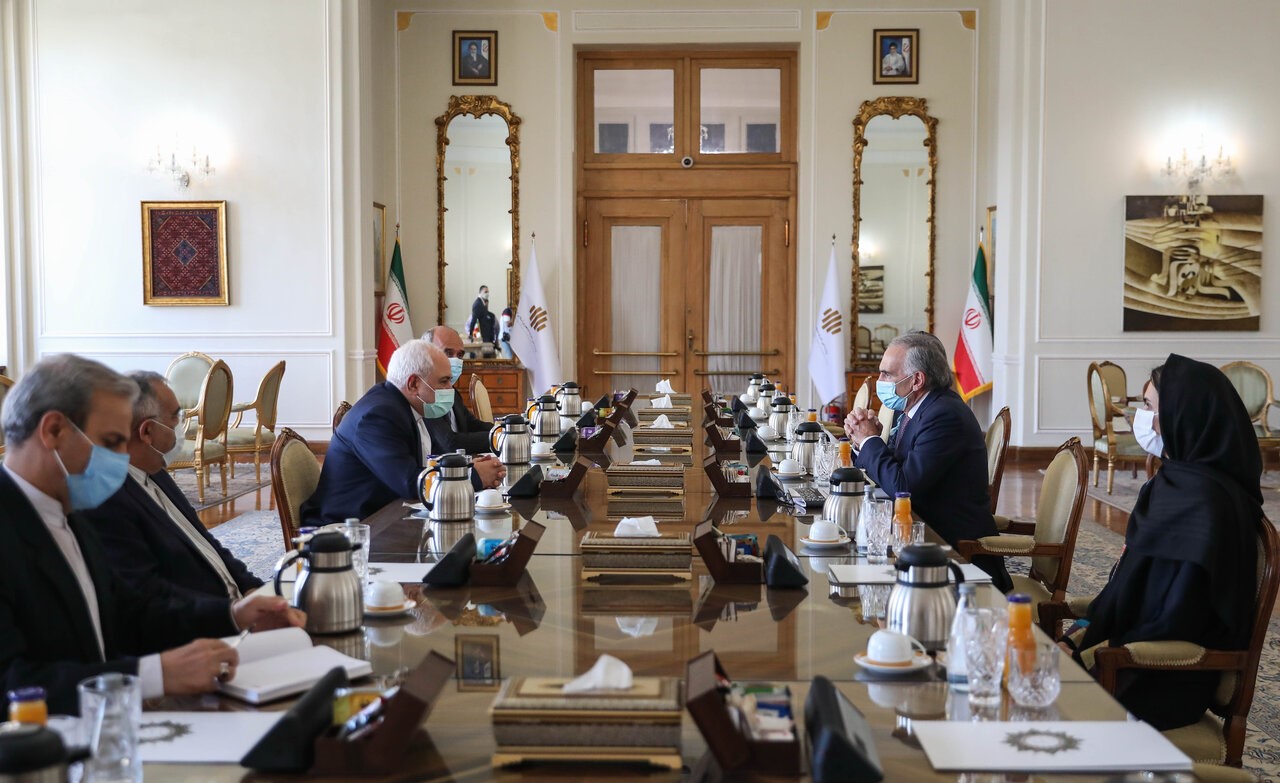The Iranian foreign minister has expressed Tehran's support for intra-Afghan talks in a meeting with United Nations’ special envoy for Afghanistan.
Heading a delegation, United Nations Secretary-General António Guterres' Personal Envoy on Afghanistan and Regional Issues Jean Arnault traveled to the capital Tehran where met with Iran’s Foreign Minister Mohammad Javad Zarif on August 8 and discussed the latest developments in Afghanistan.
During the meeting, Zarif identified the "incorrect policies of foreign powers" as one of the important factors behind the difficult and complex situation in Afghanistan.
He said that a resolution between the warring Afghan parties should come about through intra-Afghan dialogue, and added that “Iran was ready to facilitate such a dialogue”.
For his part, Jean Arnault noted the importance of collective activities of all regional countries, saying that Afghanistan's problem can be solved through collective action, and the focus of his efforts is to find a way to this collective cooperation.
Iran’s special envoy for Afghanistan Mohammad Ebrahim Taherian Fard also expressed Tehran's support for the Afghan-led peace process, as well as readiness to cooperate in facilitating and advancing intra-Afghan talks.
The Taliban militant group has significantly broadened the territory they hold amid the withdrawal of US-led troops from Afghanistan that started on May 1. US President Joe Biden said on July 8 that the military mission in the country would conclude on August 31. However, the US will still have about 650 troops in Afghanistan to protect its embassy in Kabul.
The Taliban have intensified attacks across Afghanistan over the past two months amid US troops’ withdrawal. The militants claim that they were in control of 85 percent of the country’s territory, but officials in Kabul denied these claims. Over 200 of the country's 407 district centers were reportedly under full Taliban control by the first week of July, while before May the group held only 73 districts.
The Taliban have made several advances in key provincial capitals across Afghanistan over the past three days. The first provincial capital, Zaranj, near the Iranian border, fell to the Taliban on August 6. The next, Sherberghan, near the Turkmenistan border, fell on August 7. In the past week, the US has increased airstrikes against Taliban positions in a bid to halt their advances. The Taliban has accused the US of bombing a hospital and a high school, along with other civilian targets in Helmand Province.
Afghan Foreign Minister Mohammad Haneef Atmar said on August 3 that the recent Taliban offensive had killed more than 3,000 people nationwide and displaced more than 300,000 in the last few months. The United Nations Assistance Mission in Afghanistan (UNAMA) said in a July report that some 5,183 casualties were recorded in the first six months of the year - a 47% increase from 2020.
Mohammad Hadi Marashi, the deputy governor-general for security affairs in the Iranian south-eastern province of Sistan-Baluchestan said on August 6 that the border crossing with Afghanistan had been closed, and the Iranian military forces were deployed after clashes broke out in the area.
“The Iran-Afghanistan crossing in Milak area was shut down after conflicts spread to Zaranj, the center of Nimruz Province, which borders Sistan-Baluchestan,” he added.
Earlier, Iran’s Police Deputy Commander Brigadier General Qasem Rezai called on Afghan officials to explain why a large number of Afghan people have crossed the border into Iran although no sign of war was observed in Nimruz Province.







 President Aliyev emphasized the critical role of the North-South Transport Corridor in fostering transport cooperation between Azerbaijan and Russi...
President Aliyev emphasized the critical role of the North-South Transport Corridor in fostering transport cooperation between Azerbaijan and Russi...
 The Mine Action Agency of Azerbaijan (ANAMA) reported on Thursday the discovery of a significant amount of explosives in the Khojavand district of ...
The Mine Action Agency of Azerbaijan (ANAMA) reported on Thursday the discovery of a significant amount of explosives in the Khojavand district of ...
 Russian Foreign Minister Sergei Lavrov has reasserted that Moscow has no intentions to stop the fighting in Ukraine, even if peace talks commence.
Russian Foreign Minister Sergei Lavrov has reasserted that Moscow has no intentions to stop the fighting in Ukraine, even if peace talks commence.



